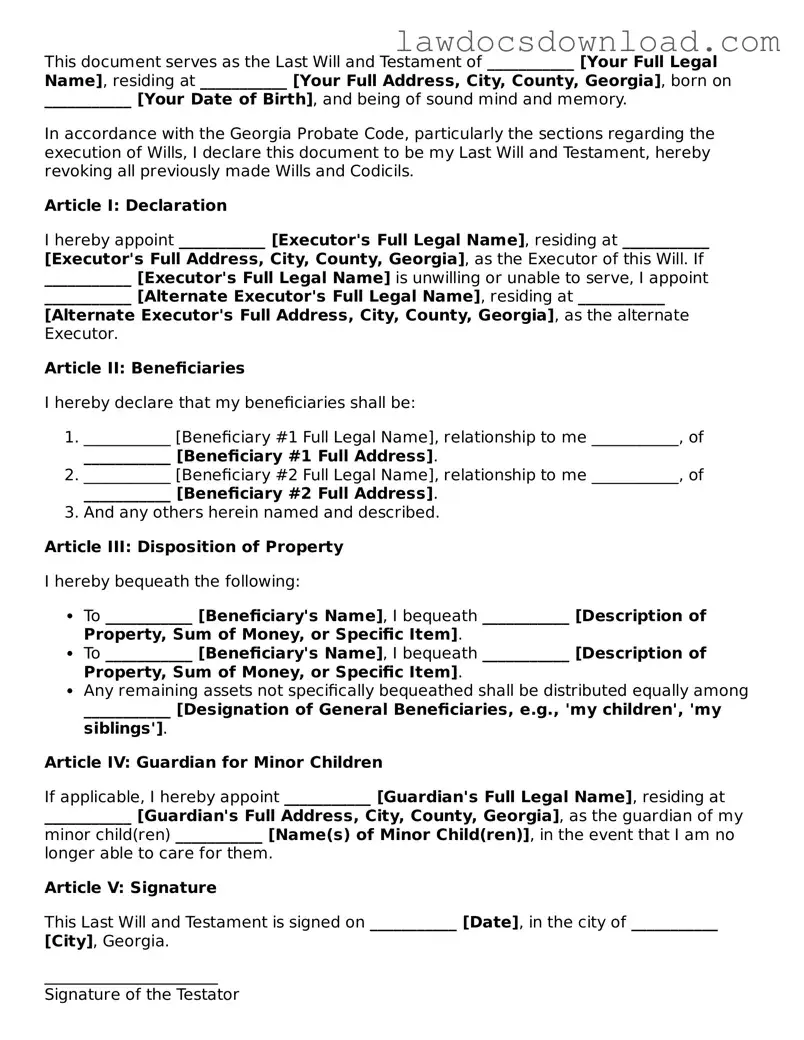This document serves as the Last Will and Testament of ___________ [Your Full Legal Name], residing at ___________ [Your Full Address, City, County, Georgia], born on ___________ [Your Date of Birth], and being of sound mind and memory.
In accordance with the Georgia Probate Code, particularly the sections regarding the execution of Wills, I declare this document to be my Last Will and Testament, hereby revoking all previously made Wills and Codicils.
Article I: Declaration
I hereby appoint ___________ [Executor's Full Legal Name], residing at ___________ [Executor's Full Address, City, County, Georgia], as the Executor of this Will. If ___________ [Executor's Full Legal Name] is unwilling or unable to serve, I appoint ___________ [Alternate Executor's Full Legal Name], residing at ___________ [Alternate Executor's Full Address, City, County, Georgia], as the alternate Executor.
Article II: Beneficiaries
I hereby declare that my beneficiaries shall be:
- ___________ [Beneficiary #1 Full Legal Name], relationship to me ___________, of ___________ [Beneficiary #1 Full Address].
- ___________ [Beneficiary #2 Full Legal Name], relationship to me ___________, of ___________ [Beneficiary #2 Full Address].
- And any others herein named and described.
Article III: Disposition of Property
I hereby bequeath the following:
- To ___________ [Beneficiary's Name], I bequeath ___________ [Description of Property, Sum of Money, or Specific Item].
- To ___________ [Beneficiary's Name], I bequeath ___________ [Description of Property, Sum of Money, or Specific Item].
- Any remaining assets not specifically bequeathed shall be distributed equally among ___________ [Designation of General Beneficiaries, e.g., 'my children', 'my siblings'].
Article IV: Guardian for Minor Children
If applicable, I hereby appoint ___________ [Guardian's Full Legal Name], residing at ___________ [Guardian's Full Address, City, County, Georgia], as the guardian of my minor child(ren) ___________ [Name(s) of Minor Child(ren)], in the event that I am no longer able to care for them.
Article V: Signature
This Last Will and Testament is signed on ___________ [Date], in the city of ___________ [City], Georgia.
______________________
Signature of the Testator
Witness Declaration
We, the undersigned, declare that ___________ [Your Full Legal Name], the Testator, has declared this document to be their Last Will and Testament in our presence, signing it in our presence, and that we, in turn, sign it in the presence of the Testator and each other on this day, ___________ [Date].
- Witness 1: ___________ [Witness #1 Full Legal Name], residing at ___________ [Witness #1 Full Address, City, County, Georgia], Signature: ___________
- Witness 2: ___________ [Witness #2 Full Legal Name], residing at ___________ [Witness #2 Full Address, City, County, Georgia], Signature: ___________

